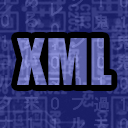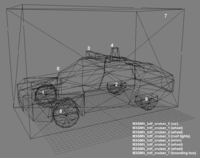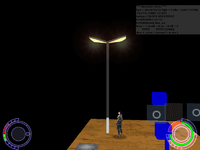XML:OFGA
| OFGA : Object Furniture Geometry Array | 
| |
|---|---|---|
| XML
OBAN << Other file types >> ONCC |
general information
- The xml code on this page is compatible with onisplit v0.9.61.0 and v0.9.68.0
- OFGA are level specific.
- OFGA files were rarely used in game, only to get the bounding box of the geometry.
- Nowadays they are used to import objects with no functions. (Doors, consoles, etc. becomes imported by their object collections. See ONLV for more information.)
tags
| XML tag | content type | description |
|---|---|---|
| <OFGA id="..."> | integer | marks the beginning of OFGA content |
| <EnvParticle> | "#" + integer | ENVP instance number (#N) |
| <Elements> | - | You can put here quite any number of <OFGAElement> tags. The array is an int32. |
| <OFGAElement> | - | |
| <GunkFlags> | flag | for more theoretic possible AGQG flags see onisplit -help enums
|
| <Geometry> | link | M3GMfile_name.oni (don't use file suffix) |
| <ENVP id="..."> | integer | Instance number. Use the one from <EnvParticle>. |
| <Particles> | - | You can put here quite a number of <ENVPParticle> tags. The array is an int16. |
| <ENVPParticle> | - | ENVP is used to store particles attached to objects or furniture: Locklights, lights, fire, smoke, steam, "electricity" etc. Loose particles are normally added to the level particle collection. |
| <Class> | char[64] | BINA3RAPfile_name.oni (don't use file prefix/suffix) |
| <Tag> | char[48] | Particle name for BSL commands. For some reason an underscore "_" will be added to the name. Examples:
|
| <Transform> | matrix | Float 3*3 + float X Y Z position of the particle. Can be used to orient and stretch the particles (decals, locklights, etc). (How?) |
| <DecalScale> | integer, integer | X Y |
| <Flags> | flag |
|
- Example 1
<?xml version="1.0" encoding="utf-8"?>
<Oni>
<OFGA id="0">
<EnvParticle></EnvParticle>
<Elements>
<OFGAElement>
<GunkFlags>NoCharacterCollision NoOcclusion</GunkFlags>
<Geometry>M3GMV_tctf_cruiser_0</Geometry>
</OFGAElement>
<OFGAElement>
<GunkFlags>NoCharacterCollision NoOcclusion</GunkFlags>
<Geometry>M3GMV_tctf_cruiser_1</Geometry>
</OFGAElement>
<OFGAElement>
<GunkFlags>NoCharacterCollision NoOcclusion</GunkFlags>
<Geometry>M3GMV_tctf_cruiser_2</Geometry>
</OFGAElement>
<OFGAElement>
<GunkFlags>NoCharacterCollision NoOcclusion</GunkFlags>
<Geometry>M3GMV_tctf_cruiser_3</Geometry>
</OFGAElement>
<OFGAElement>
<GunkFlags>NoCharacterCollision NoOcclusion</GunkFlags>
<Geometry>M3GMV_tctf_cruiser_4</Geometry>
</OFGAElement>
<OFGAElement>
<GunkFlags>NoCharacterCollision NoOcclusion</GunkFlags>
<Geometry>M3GMV_tctf_cruiser_5</Geometry>
</OFGAElement>
<OFGAElement>
<GunkFlags>NoCharacterCollision NoOcclusion</GunkFlags>
<Geometry>M3GMV_tctf_cruiser_6</Geometry>
</OFGAElement>
<OFGAElement>
<GunkFlags>Invisible NoObjectCollision</GunkFlags>
<Geometry>M3GMV_tctf_cruiser_7</Geometry>
</OFGAElement>
</Elements>
</OFGA>
</Oni>
- Example 2
<?xml version="1.0" encoding="utf-8"?>
<Oni>
<OFGA id="0">
<EnvParticle>#1</EnvParticle>
<Elements>
<OFGAElement>
<GunkFlags>NoOcclusion</GunkFlags>
<Geometry>M3GMstreetlight_0</Geometry>
</OFGAElement>
</Elements>
</OFGA>
<ENVP id="1">
<Particles>
<ENVPParticle>
<Class>env_lensflare09</Class>
<Tag>streetlight</Tag>
<Transform>1 -4.559326E-08 1.35404189E-05 -1.354042E-05 -2.03512554E-05 1 -4.53176945E-08 -1 -2.03512554E-05 1.3262 63.5907 10.4082</Transform>
<DecalScale>1 1</DecalScale>
<Flags></Flags>
</ENVPParticle>
<ENVPParticle>
<Class>env_lensflare09</Class>
<Tag>streetlight</Tag>
<Transform>1 -4.559326E-08 1.35404189E-05 -1.354042E-05 -2.03512554E-05 1 -4.53176945E-08 -1 -2.03512554E-05 1.3262 63.5907 -8.877</Transform>
<DecalScale>1 1</DecalScale>
<Flags></Flags>
</ENVPParticle>
</Particles>
</ENVP>
</Oni>
export
To extract the OFGA file.
OniSplit -extract:xml out in/OFGA*.oni
To extract M3GM parts only.
OniSplit -extract:obj out in/OFGA*.oni
import
Be sure your obj file contains triangulated meshes. Quads can give you visual glitches.
OniSplit out_folder -create:m3gm [-tex:texture_name] input_folder/file.obj
- -tex argument is optional but you should use it to prevent bugs
After TXMP, M3GM and OFGA creation you can go on to furniture file.

